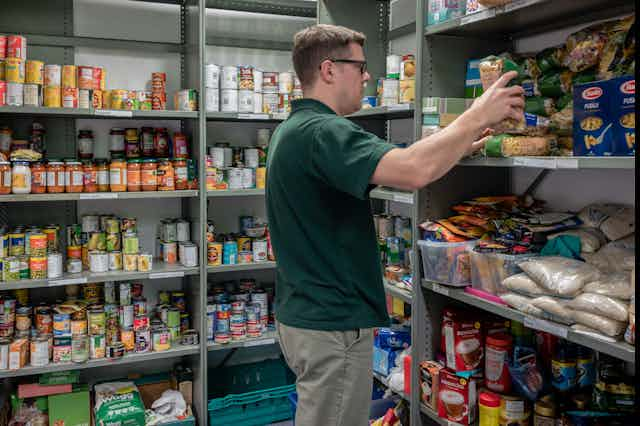More people than ever before are being forced to turn to food banks. Over the last six months, there’s been the steepest increase in emergency food parcel handouts in five years, according to the Trussell Trust, Britain’s largest food bank provider.
The Trussell Trust recently released the State of Hunger report, claiming it to be “the most authoritative piece of research into what causes hunger in the UK”. The scale of this work, and the clear links it draws between food insecurity and the welfare state, should be welcomed.
But the report fails to discuss important issues associated with food banks and food insecurity. And it presents a narrative that individualises aspects of food insecurity and undermines the collective response needed to tackle growing poverty and destitution.
The Trussell Trust is an anti-poverty charity “founded on Christian principles” and cites Matthew 25:35-36 as its founding verse:
For I was hungry and you gave me something to eat, I was thirsty and you gave me something to drink, I was a stranger and you invited me in, I needed clothes and you clothed me, I was sick and you looked after me, I was in prison and you came to visit me.
The organisation actively maintains its Christian identity, recently recruiting a head of church engagement with responsibility for “strengthening and shaping the relationship between the Trussell Trust and the Christian community” – and concerns have been raised that some food banks within the Trussell Trust network employ only people of a Christian faith as food bank managers’.
Yet there is not a single mention of religion, faith or Christianity in the State of Hunger report. It describes the ethnic group of people referred to Trussell Trust food banks, but it doesn’t report the religious affiliation of food bank clients.
Evangelical device?
Our research has identified a stark under-representation of south Asian Muslims at Trussell Trust food banks and found that staff discussions of Christianity in the food bank may be putting people off accessing this food support. Discussing food banks with the manager of a community centre in a deprived area of York we were told:
People who are already vulnerable and quite often at rock bottom and hungry, trying to keep themselves or their families fed, do not want to have religion pushed in their faces. To be prayed for because they are hungry is not how people should be treated.
I have several times complained to the Trussell Trust and was told that, “It is [our] policy and will not be changed”. We have several people that have refused to take a food voucher due to this issue and have gone hungry.“
The failure to discuss the religious identity of Trussell Trust food banks and the religious affiliation of clients disregards a key element of food banking in the UK.
A failure to cope?
The report provides an excellent, detailed discussion of the impact of the benefit system on people with health conditions, showing how failures in the system drive people to food banks. It finds that over half of respondents in the State of Hunger have a mental health condition and a third are unable to work because of poor health.
This analysis is framed by language that individualises the food insecurity experiences of people with health conditions in receipt of welfare benefits, for instance, by talking about how people "cope” with “challenging life events” or the universal credit five-week wait.
Our research shows that people with health conditions, particularly mental illness, are fundamentally disadvantaged in the benefits system. For instance, people with mental illnesses lose out financially when they move from disability living allowance to personal independence payments, compared with those with some other health conditions.
This may be because mental health conditions are not well-understood in the social security system. Similarly, the employment gap for people with mental health conditions compared with the general population is at least 10% and higher for those with a severe mental illness.
Low pay economy
It is clear from the State of Hunger that problems associated with universal credit are a key driver of food insecurity. The Department for Work and Pensions has acknowledged these links.
Few respondents in the report were in work, so the focus is directed towards how universal credit functions for people whose wages tend to fluctuate. There is a bigger picture here, though, about the need to challenge an unequal system that enables a low-pay economy and lack of employee rights, which in turn increase insecure employment and poverty.
Asda, a main funder of the State of Hunger research project, for example, is embroiled in controversy over the decision to move their workers on to more “flexible” contracts.
By omitting or compartmentalising these issues there is a risk that the focus is placed too much on particular people and away from the systemic drivers of food insecurity. People already feel stigmatised by their interactions with both the welfare system and food banks. And these omissions could have consequences for the same marginalised people that the report sets out to help.

